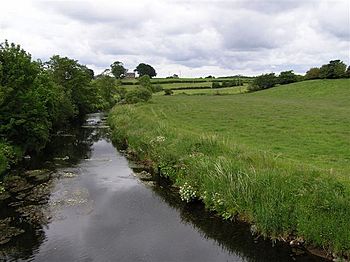River Bush facts for kids
Quick facts for kids River Bush |
|
|---|---|
 |
|
| Native name | an Bhuais |
| Country | Northern Ireland |
| Counties | Antrim |
| District | Causeway Coast and Glens |
| Cities | Bushmills, Stranocum, Armoy |
| Physical characteristics | |
| Main source | Antrim Mountains, Northern Ireland |
| River mouth | Portballintrae, Northern Ireland |
| Length | 54 km (34 mi) |
| Basin features | |
| Basin size | 340 km2 (130 sq mi) |
The River Bush is a river in County Antrim, Northern Ireland. Its name comes from the Irish words an Bhuais. The River Bush is about 54 kilometers (33.5 miles) long. It starts high up in the Antrim Mountains at 480 meters (1,575 feet).
From its source, the river flows mostly northwest. It makes a turn near the town of Armoy. Then it flows west, passing through Stranocum. Finally, it turns north and goes through Bushmills before reaching the sea. The river ends at Portballintrae on the North Antrim coast.
The River Bush flows through a very rich valley. This area is mostly used for farming, especially for growing grass for animals. The ground beneath the river is made of basalt rock. This makes the water slightly alkaline, which means it's not acidic. The water also has a lot of magnesium, which makes it "hard" water.
River Life: Fish and Water
The River Bush is home to native fish. You can find Atlantic salmon and brown trout living here. A small stream called Saint Columb's Rill flows into the River Bush. This stream is special because its water is used to make Bushmills whiskey.
Angling for Salmon and Trout
The River Bush has always been famous for salmon fishing. Even though the number of salmon went down in recent years, it still offers great fishing. The river is carefully managed by the Department of Culture, Arts and Leisure (DCAL). They work to keep it a top salmon river.
River Bush Salmon Research Project
The Department also runs a fish farm and hatchery. This is at the River Bush Salmon Station, which you can visit. This station helps with the River Bush Salmon Research Project. This project started in 1972. It studies the life of Atlantic salmon in both fresh river water and salty sea water. Because of this research, the River Bush is recognized as an important river by the International Council for the Exploration of the Sea (ICES).

